
by Molly Jameson | Aug 20, 2018
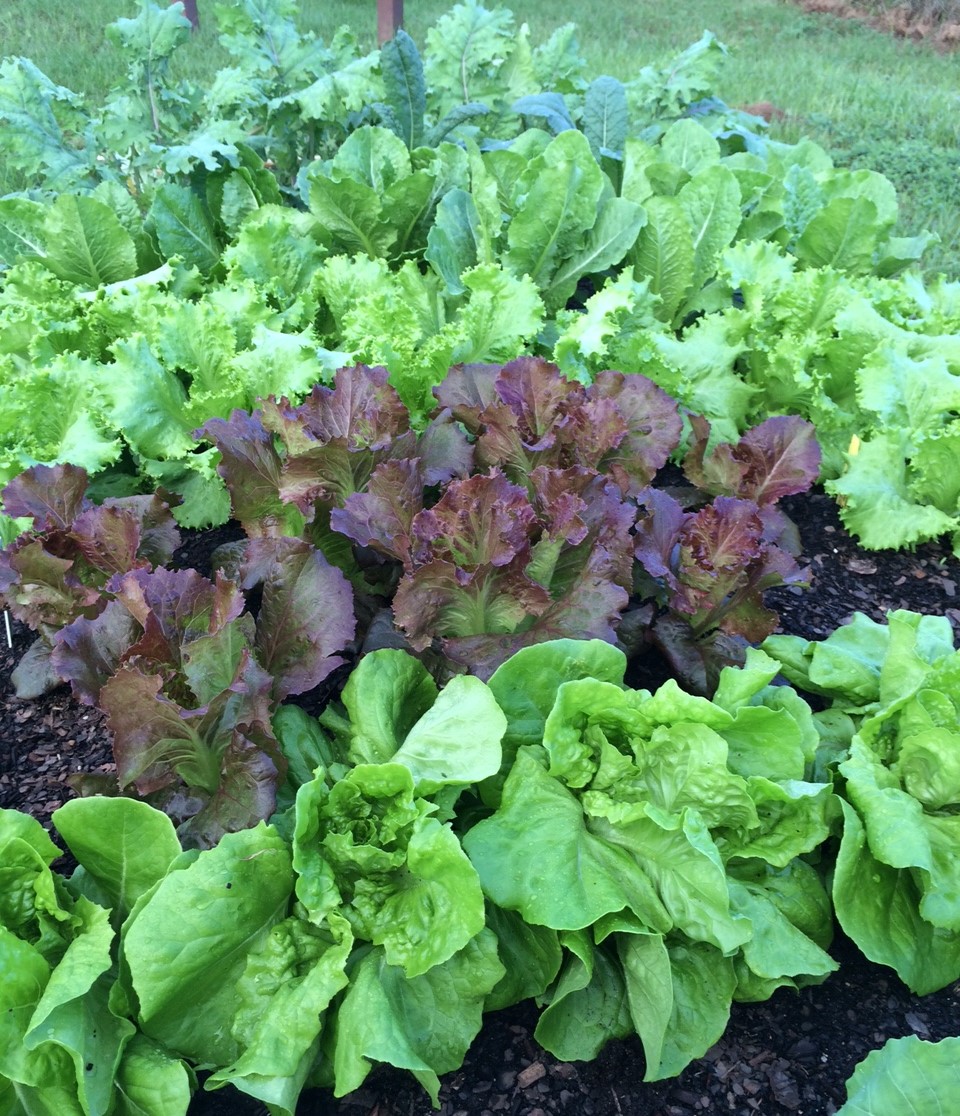
Start preparing now so your fall garden will be full of dark leafy greens, multi-colored lettuces, and root vegetables of all shapes and sizes. Photo by Molly Jameson.
August is a double-edged sword. The oppressive heat is at its pinnacle – where even the thought of spending time in the garden makes you break into a sweat – but it is also the time of year that visions of fall start coming into focus, and you can’t help but peek at the weekly forecast for signs of declining temperatures.
If your garden looks anything like mine, there are sweet potato vines weaving in and out of every corner of sunlight they can find. The sweet peppers you let fully ripen are bright red and sweeter than ever. You may have already reaped the reward of your watermelons, but you’re still hoping you can get the harvest timing right for the late season bloomers. Your okra is as tall as you – maybe even taller – and you’re grateful, for their big oblong heart-shaped leaves are shading out at least some of those warm-season weeds.
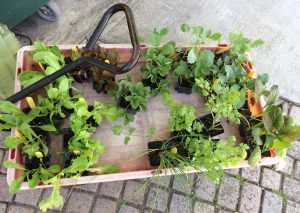
Fall is the time to start growing kale, lettuce, onions, parsley, mustard greens, and much more. Photo by Molly Jameson.
But the seasons are-a-changing, and soon you’ll be pulling up the last of your summer garden to make room for dark leafy greens, a cornucopia of roots, and a rainbow of lettuce varieties.
If this is making you want to rush to your nearest plant nursery and unearth all your half-used fall seed packets, then come on down to the Leon County Extension Office in Tallahassee to join us for our annual Fall Backyard Gardening Series!
This is a two-part series, running from 6:00 to 8:00 p.m. on September 4 and 6:00 to 8:00 p.m. on September 11, 2018, at 615 Paul Russell Road. I, along with Extension Agents Mark Tancig and Trevor Hylton, will discuss garden site selection, soil and fertilization, and fall planting and gardening techniques. As a bonus, you’ll leave with freshly planted vegetable seeds to take home to later transplant into your garden.
Please register on Eventbrite. The cost for both evenings is $10, and light refreshments will be provided. For more information, contact Molly Jameson at mjameson@ufl.edu or by phone at 850-606-5219.
And if you’re not in the Tallahassee area, check with your local extension office to see what fall gardening events they may have available. Tending a fall garden in Florida can be one of the most rewarding outdoor endeavors you can experience!
by Molly Jameson | Jan 10, 2018
Every gardener should know a thing or two about farming. Join UF/IFAS Extension at the 2018 Panhandle Fruit and Vegetable Conference to not only learn about market vegetable production, fruit and nut production, and much more, but also to attend the pre-conference farm tour and listen to a speech by the Keynote Speaker, Dr. Joy Rumble, an Assistant Professor in the Department of Agricultural Education and Communication at the University of Florida.

Dr. Joy Rumble, the 2018 Panhandle Fruit and Vegetable Conference Keynote Speaker.
Dr. Rumble is originally from Mount Gilead, Ohio. She earned a bachelor of science degree from The Ohio State University, majoring in animal science. During her undergraduate studies, Dr. Rumble raised livestock, worked as an intern on two large swine operations, and served as a summer intern for the USDA Farm Service Agency. She earned a master of science degree in agricultural communication and continued her education at the University of Florida, where she graduated with her doctorate in agricultural education and communication in 2013.
Dr. Rumble is now an Assistant Professor and Extension Programming Coordinator with the University of Florida. Her research focus is effective communication and raising awareness of agricultural and natural resources issues within the agricultural industry. She concentrates many of her outreach initiatives at the UF/IFAS Center for Public Issues Education in Agriculture and Natural Resources (PIE Center).
At the PIE Center, Dr. Rumble strives to measure knowledge, behaviors, and perceptions of agriculture of Florida constituents and responds to the many economic, environmental, and social challenges we face within the state. She often shares her findings through the Easy as PIE webinar series to allow both the public and Florida’s policymakers to make informed decisions to preserve the assets of the state’s agricultural and natural resources. Most recently, Dr. Rumble was a speaker for an Easy as PIE webinar to discuss a statewide strategic plan for agritourism.
Dr. Rumble’s service as the UF/IFAS Extension Programming Coordinator creates improved citizen awareness of agriculture and natural resources through UF/IFAS County Extension Offices.
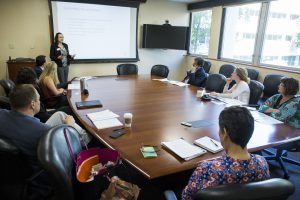
Dr. Rumble assisting with a UF/IFAS campus tour for Florida Senator Bill Nelson’s staff on October 18th, 2016.
Make plans to attend the 2018 Panhandle Fruit and Vegetable Conference on Tuesday, February 20, from 8 a.m. to 5 p.m., at the University of West Florida Conference Center (11000 Conference Parkway, Building 22) in Pensacola, Florida. You will learn about the importance of agricultural communication from Dr. Rumble directly, and attend conference educational tracts on North Florida Citrus Production, Fruit and Nut Production, Vegetable Production, Marketing, Food Safety, and Protected Agriculture. The conference will also provide an opportunity for networking and give you a chance to meet farmers from across our region.
Also included in the conference ticket price is the pre-conference “Buy Local” farm tour on Monday, February 19, 1 p.m. to 8 p.m. Tour buses will start out at the University of West Florida and will make three stops, traveling to the Gulf Coast Research and Extension Center in Fairhope, Alabama, a hydroponic vegetable farm in Daphne, Alabama, and the Allegri Farm Market, also in Daphne, Alabama.
For more information and registration visit https://pfvc2.eventbrite.com. Early bird registration is $50 (+ service fee), before February 1, 2018. Your registration includes continental breakfast, lunch, refreshments, educational materials, and transportation to the farm tour locations. We look forward to seeing you there!
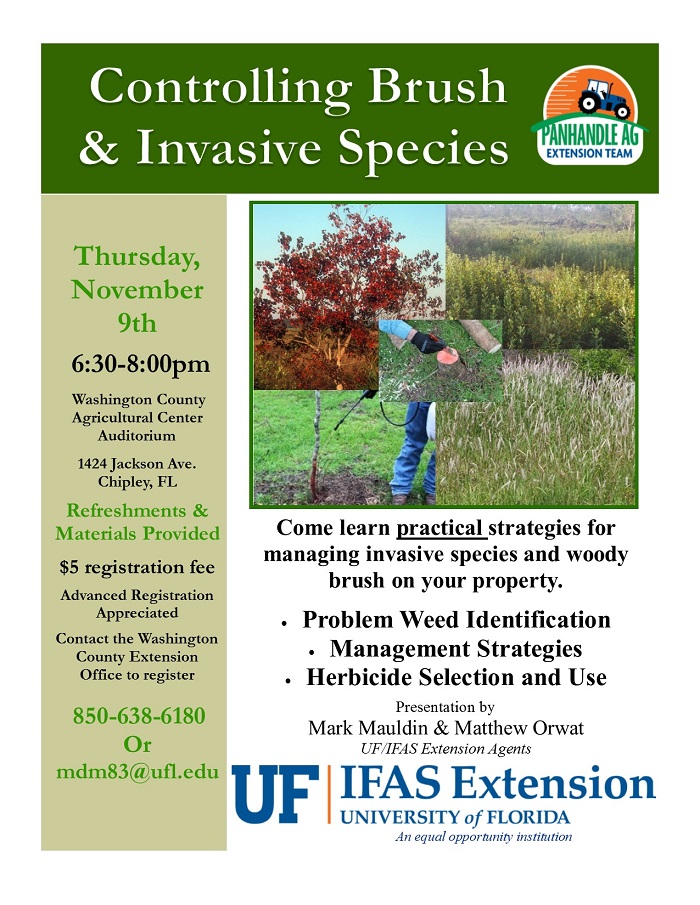
by Matthew Orwat | Oct 26, 2017
Encroaching brush, whether native or invasive, can be a problem for properties large and small. Fighting woody brush and other hard-to-kill weed species can be challenging for property owners. Many factors affect the effectiveness and efficiency of control efforts.
Timing of the application is a key factor that many property owners fail to consider. The cooler, fall and winter months are an excellent time to control a wide variety of troublesome brush species. With this in mind, the Washington County Extension Agents will be presenting a class, Controlling Brush & Invasive Species on November 9, 2017. The class will focus on plant identification and specific chemical control strategies that are effective in the fall and winter months. Herbicide selection and application techniques will be addressed in detail.
Controlling Brush & Invasive Species will be held at the Washington County Agricultural Center (1424 Jackson Ave., Chipley, FL) on Thursday, November 9, 2017 at 6:30 in the evening. Refreshments and printed reference materials will provided. There is a $5 registration fee for the class, payable at the door. Advanced registration for the class is appreciated. If you have questions or would like to register please contact Mark Mauldin at the Washington County Extension Office (850-638-6180 or mdm83@ufl.edu).

by Molly Jameson | Sep 18, 2017
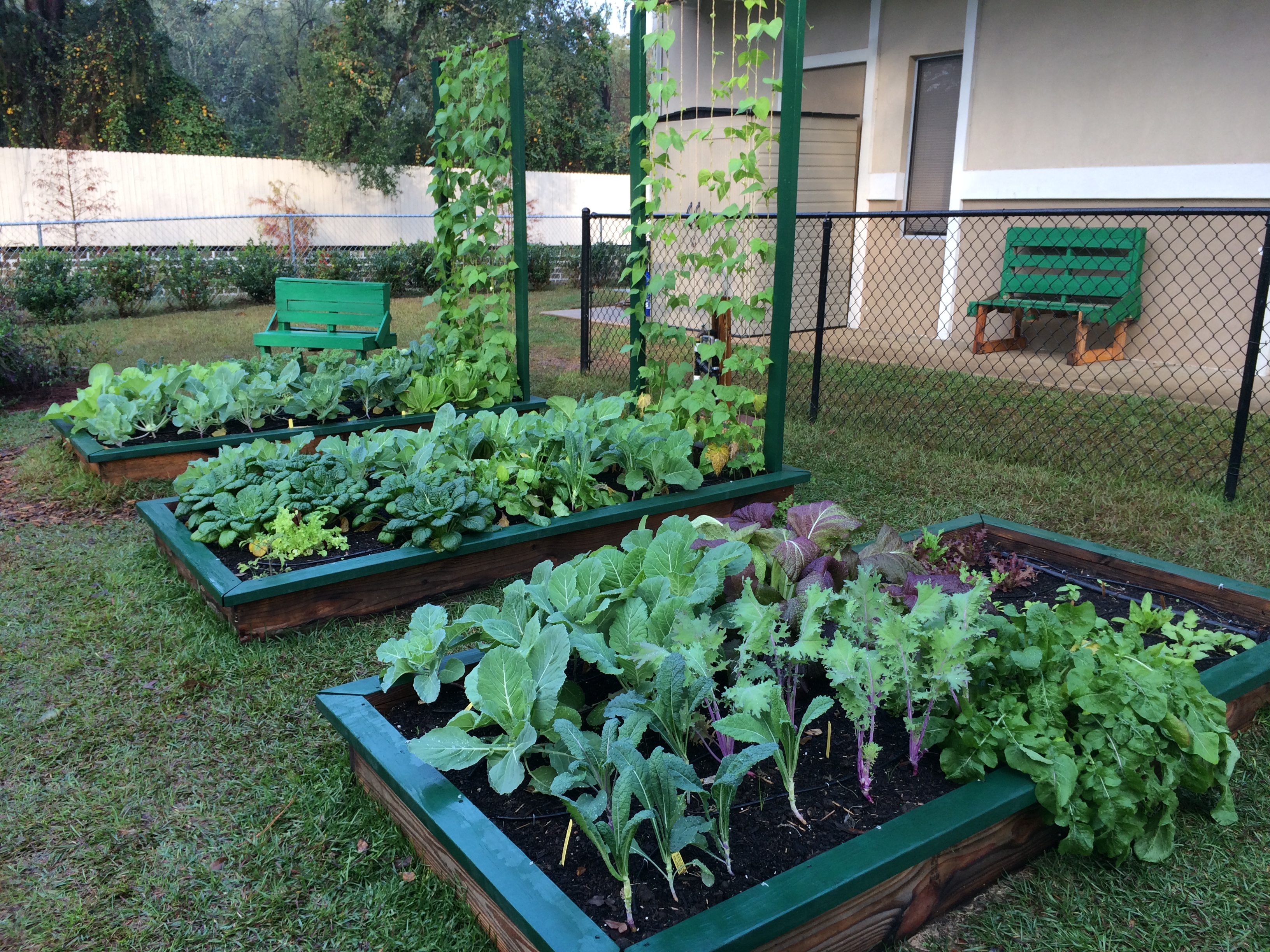
The Garden Educator Training Series helps garden leaders start or improve their school or community garden. Photo by Molly Jameson.

By Tiffany Torres
Tiffany Torres is the Family Nutrition Program Northwest District Food Systems Specialist with UF/IFAS Extension.
With the cooler months of fall upon us, school gardens across the Panhandle are beginning to awaken from their summer slumber. Soon, students and teachers will begin to replenish the soil, plant their seeds, and dive into an engaging edible education experience.
For these schools and communities, gardens are much more than just a few beds of carrots. School gardens serve as outdoor classrooms, bringing academic concepts to life in new and exciting ways, while also encouraging environmental stewardship. In addition, school gardens can expose students to lifelong healthy eating habits by inspiring them to try new fruits and vegetables. In time, the school garden can become a facet of school culture and pride, ultimately reinforcing an overall healthier school food environment for students, teachers, parents, and the broader community.
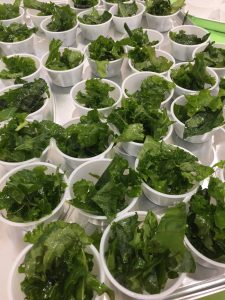
School gardens can inspire students to try foods, impacting their eating habits long-term. Photo by Molly Jameson.
To help support teachers and other school garden stakeholders on this journey, specialists at the University of Florida IFAS Extension Family Nutrition Program developed a seasonal school and community garden training. The “Garden Educator Training Series” provides teachers and volunteers with tools for improving school garden education, enjoyment, and long-term outcomes. This monthly education and networking opportunity welcomes teachers who want to start and sustain school gardens, college students who want to volunteer with local gardening projects, and other garden enthusiasts, such as Master Gardeners, who want to lend their time to ensure the success of school and community gardens.
Each session includes three engaging components: 1) seasonally relevant, hands-on gardening skills; 2) curriculum and education connections; and 3) community organizing strategies to build team commitments. Sessions also include an opportunity to share successes and challenges amongst fellow attendees, resulting in a stronger school and community garden network. Each garden project leader will build a “Living History Binder,” which they will fill with resources throughout the series and use with their team to help organize their garden projects.
Through the Garden Educator Training Series, it is our hope that everyone involved will gain tangible and valuable skills to launch or improve their school or community garden projects. The program will give educators the tools necessary to design their gardens to be outdoor classrooms; promote health and wellness through gardening; facilitate community engagement; and teach students valuable life skills such as teamwork, cooperation, focus, and patience – inspiring the next generation of “garden leaders, not just garden weeders.”
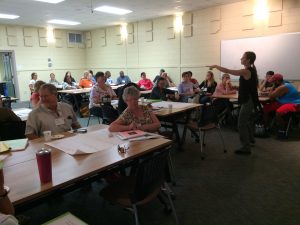
The Series provides teachers and volunteers networking opportunities and tools to improve school garden education. Photo by Molly Jameson.
Interested in participating in the Garden Educator Training Series? The Series is free of charge, and will take place at the Leon County Extension Office (615 Paul Russell Rd, Tallahassee, FL). Fall sessions are 4:30 to 6:30 p.m. on September 14th, October 12th, November 9th, and November 30th. To register, visit the UF/IFAS Leon County Eventbrite website (https://leongetsfall2017.eventbrite.com).
For further information, please contact the UF/IFAS Extension Office at Leon County by calling (850) 606-5200.
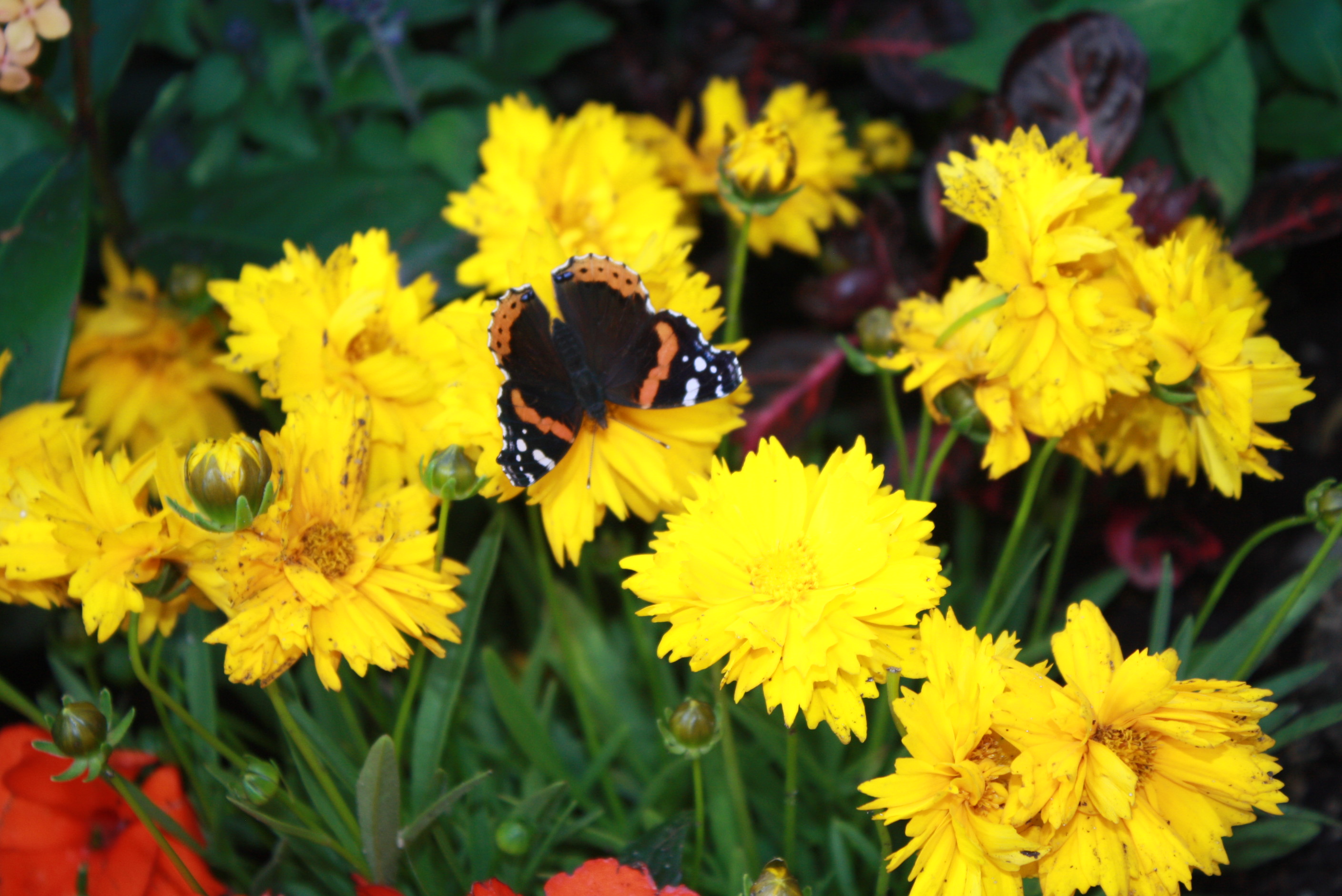
by Matt Lollar | Jun 2, 2017
The Jackson County Master Gardeners are hosting a Mead Making Workshop on Saturday, June 17 at the Jackson County Agricultural Center Classroom, 2741 Penn Avenue, Marianna, FL. Registration opens at 8:30 AM (Central Time) and the event will end at 2:00 PM.
Mead is an alcoholic beverage made from fermenting honey. Mead is described in various writings from Aristotle, Pliny the Elder, and in the epic poem Beowulf. This workshop will teach you everything you need to know in order to make your own mead at home! You will go home with a small carboy, airlock, honey, and yeast.
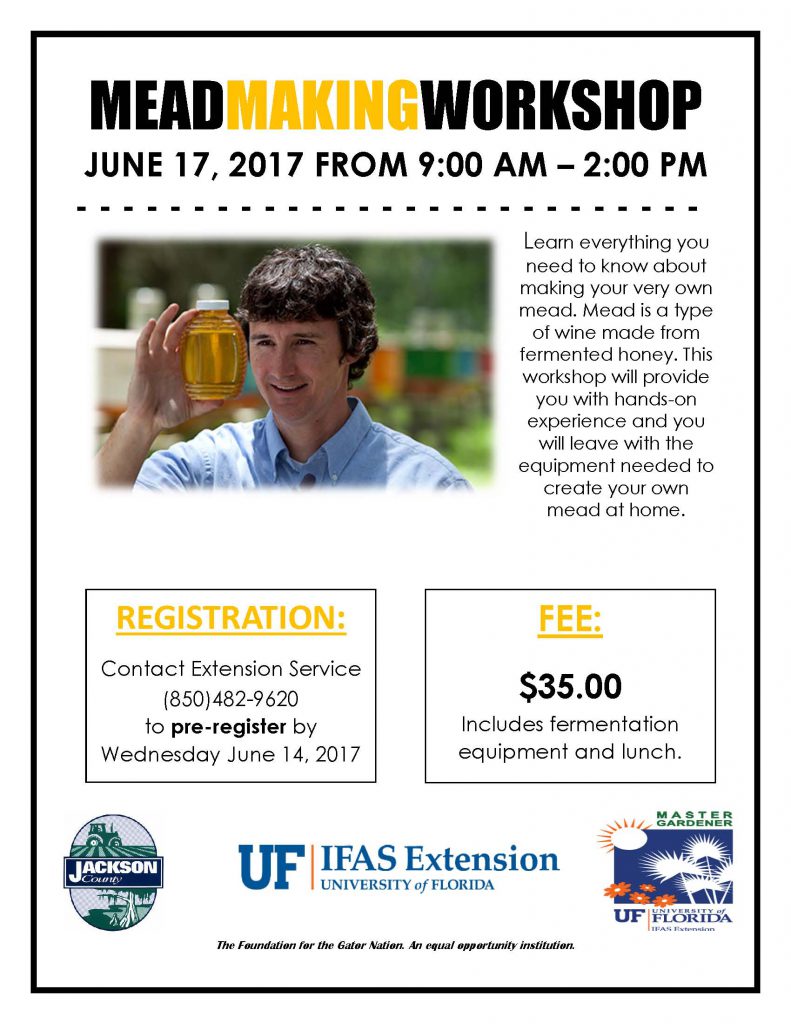
The registration fee is $35.00 and covers lunch and all materials and equipment to make your own mead. The workshop is limited to 24 participants. For more information, please see the Mead Making Workshop Flyer. You can pay at the door, but we do ask that you call the Jackson County Extension Office to RSVP at: 850-482-9620 or email mlollar@ufl.edu.
by Molly Jameson | May 11, 2017
If you are a farmer, you have most likely heard about the Food Safety Modernization Act, or FSMA, by now. If you are not a farmer, you probably do not know that food safety regulations are going through a big change. The FSMA, which was passed in 2011, is considered the largest update to food safety regulation in over 80 years.
The proposed produce safety rule under the FSMA is very robust, establishing the minimum standards for worker training, health and hygiene, agricultural water use, animal soil amendments, on-farm domesticated and wild animals, equipment, tools, buildings, and sprout production.
But this new rule will not apply to all farmers. The commodities they produce and the value of their produce sold will ultimately dictate whether they will need to comply.
First, the rule does not apply to produce that is not a raw agricultural commodity, or commodities the Food and Drug Administration (FDA) has identified as “rarely consumed raw.” Secondly, if a farm has an average value of produce sold of $25,000 or less within the previous three years, they are also exempt.
If the farmer produces an agricultural commodity in which the rule applies and the value of their produce sold is over $25,000, it is still possible the farm will be exempt from most of the requirements.
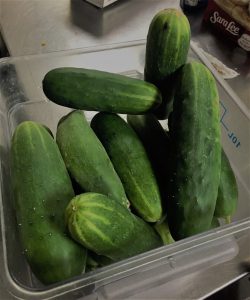
Fresh cucumbers, for example, are considered a raw commodity. But cucumbers that will undergo further processing, such as for pickling, would be eligible for exemption from the produce rule. Photo by Molly Jameson.
For instance, if the average annual monetary value of food sold directly to qualified end-users was more than the average annual value of the food sold to all other buyers within the previous three-year period, the farmer would meet the first half of exemption eligibility.
What is a “qualified end-user”, you ask? They are considered the consumers of the food, or restaurant or retail food establishment, located with the same state as the farm that produced the food (or no more than 275 miles).
But even if farmers meet the above exemption eligibility standards, they must also meet the second requirement. That is, the average annual monetary value of all food sold during the three-year period must be less than $500,000, when adjusted for inflation.
If this all sounds confusing, you are not alone! This is why the FDA developed a chart to help farmers determine if they will be exempt: Standards for Produce Safety – Coverage and Exemptions/Exclusions for Proposed 21 PART 112.
Whether farms will be exempt from the FSMA produce safety rule or not, it is always a good idea to follow good agricultural practices and to have a farm food safety plan. To learn more about food safety on farms, view the EDIS document Food Safety on the Farm: An Overview of Good Agricultural Practices.
If you are a farmer, or know someone who would benefit from having a food safety plan, the UF Small Farms Academy Extension Agents are offering a Building Your Own Farm’s Food Safety Manual Workshop in Tallahassee to help growers develop their own food safety manuals.
The workshop is tailored to fresh fruit and vegetable farms, fields, or greenhouses and is partially supported by a grant through the Florida Specialty Crops Block Grant program from the Florida Department of Agriculture and Consumer Service.
The registration fee is $35 for the first person representing a farm and $15 for an additional attendee from that farm. The workshop is limited to 20 farms on a first come, first serve basis.
The workshop will take place at the Amtrak Station, County Community Room, 918 Railroad Ave, in Tallahassee, FL, on Tuesday, May 23, 8:00 a.m. to 4:00 p.m. Register on Eventbrite by following this link: https://farmfoodsafetymanualworkshop.eventbrite.com
Please note, this class will help farmers develop their farm’s food safety manual, but it does not fulfill the new FDA FSMA one-time training requirement.













